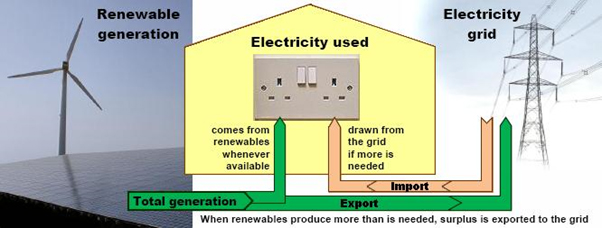
We will only install the highest quality Solar Power technology, with some of the best guarantees in the industry.

With ever-rising energy costs Solar Power has become an increasingly attractive option for homeowners over the past few years. Householders who fit domestic solar panels to their property can now benefit in a number of ways:
We will only install the highest quality Solar Power technology, with some of the best guarantees in the industry. Due to our long-standing relationships with our suppliers and manufacturers we are able to offer some of the most competitive rates on the market.
During the period of installation there is minimal impact on your home and once the Solar Power system is installed one of our technicians will show you round the system and explain how everything works.
A domestic solar power system requires a minimum investment of around £5,000 (including VAT). This covers supply and installation of solar panels, inverter, isolators, cabling, relevant testing, certification and reporting to regularity bodies and your electricity company

Not in the vast majority of cases. However, if you want your system ground mounted, or your property is part of a world heritage site, or is listed, then planning permission would likely have to be sought in advance. We will provide full assistance in completing applications
Here at R.J.Coleman (Solar) we are experts in Solar Power systems from consultation, installation through to registration. We will help you pick the right Solar Power system for your home and support you every step of the way. Contact us today and arrange your survey.
Call us on 01724 851111 or email green@rjcoleman.co.uk and we will get back to you.

The Smart Export Guarantee is a support mechanism designed to ensure small-scale generators are paid for the renewable electricity they export to the grid. It has been in place since 1 January 2020.
Following the closure of the Feed-in Tariff (FIT) scheme to new applicants in March 2019, the government recognised the need to pay small-scale renewable energy generators for the electricity they export to the grid. Consequently, the Department for Business, Energy and Industrial Strategy (BEIS) introduced the Smart Export Guarantee (SEG).
Under the scheme, all licenced energy companies with 150,000 or more customers must provide at least one SEG tariff. Smaller suppliers can offer a tariff if they want to on a voluntary basis. All suppliers can also choose to offer other means of making payments for exported electricity, separate to the SEG arrangements (see ‘Alternative finance arrangements’ below).
If you already receive a FIT on your installation, this is unaffected by the introduction of the SEG.
The following renewable energy installations are eligible for the smart export guarantee:
Any typical domestic system would be well within these size limits.
The technology and installer used by householders must be certified under the Microgeneration Certification Scheme (MCS) or equivalent. Energy suppliers may ask you to provide a MCS certificate to prove your installation meets this standard.
You will also need a registered smart meter that records your exported electricity, even if you’re not signing up to a smart tariff.
There are no set or minimum tariffs for the SEG – the only requirement is that the tariff must be greater than zero at all times. In practice, this means that it is up to energy suppliers to decide what tariffs to offer their customers. They may choose to offer multiple tariffs or just one.
SEG tariffs can be fixed or variable. A fixed SEG tariff will pay a determined rate per kWh of electricity exported over the length of the contract. A variable SEG tariff will vary the price based on market demand, with the only requisite that prices never fall below zero.
Ofgem publishes a list of SEG licensees every year. You should contact the energy supplier directly for information on their available SEG tariffs.
Yes. The only exception is if you already receive payments under the FIT scheme. You cannot receive both FIT export and SEG payments, although you can choose to opt out of your FIT (export) payments and receive SEG payments instead, while continuing to receive FIT generation payments.
You will not be able to receive SEG from more than one supplier.
If you’ve included an energy storage system in your renewables installation, you can still apply for SEG, but there might be a few rules, depending on your SEG contract. Your battery could store electricity from the grid (known as brown electricity) before exporting it later on.
Energy suppliers do not have to pay you for brown electricity exported to the grid but they may choose to do so.
Some suppliers may only pay the SEG for green electricity, ie the electricity your low-carbon system generates itself. If this is the case, the supplier may ask you to show how you separate out the green electricity you generate from any imported brown electricity. Speak to your installer about how to do this.